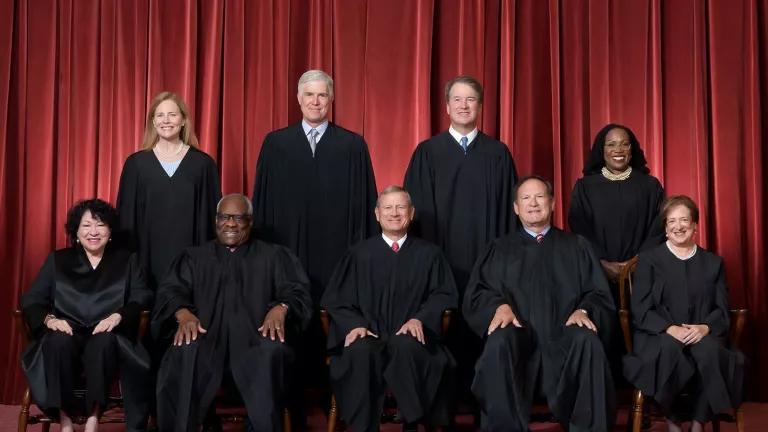Bristol Bay Coalition Rejects Pebble Mine’s Claim of Support

Pebble’s efforts to woo support for reckless mining scheme fail to persuade broad-based local opposition.
Opponents of Pebble Mine, proposed for the headwaters of the Bristol Bay wild salmon fishery in southwest Alaska, are speaking out once again to stop the widely condemned project.
A broad coalition of Bristol Bay groups and their partners reiterated that they’ll do “everything within [their] power to protect the Bristol Bay region from the Pebble Mine.” They sent a detailed letter to Pebble Limited Partnership (“Pebble”) CEO Thomas Collier, in response to contentious correspondence in December and January from him and his staff to one of the mine’s leading opponents, Bristol Bay Native Corporation (“BBNC”).
The letter’s signers include:
- United Tribes of Bristol Bay (“UTBB”), a tribally-chartered consortium representing 15 tribal governments—and more than half the population—in the Bristol Bay region;
- Bristol Bay Economic Development Corporation (“BBEDC”);
- Bristol Bay Native Association (“BBNA”);
- Commercial Fishermen for Bristol Bay (“CFBB”);
- Sportsman’s Alliance for Alaska;
- Salmon State; and,
- Natural Resources Defense Council.
The Bristol Bay-based coalition unequivocally rejected Collier’s claims of progress by Pebble in gaining support in the region:
“While we hear your frustration at the continuing opposition to your project by BBNC and so many others, your correspondence, in language and substance, reflects again the kind of clumsy duplicity and hollow assurances that, over the past decade, have plagued the Pebble project and its last remaining partner, Northern Dynasty Minerals.”
They then cited a series of “misstatements” and “omissions” in Pebble’s recent correspondence as evidence of the company’s “latest attempt . . . to elevate the desperate financial interest of Northern Dynasty over the interests and long-expressed opposition of the region’s residents.”
Examples cited, supported by brief excerpts from the Coalition letter, include:
1. History of Pebble
“Over the past eight years, the Pebble project has been abandoned by Mitsubishi Corporation (2011), Anglo American (2013), Rio Tinto (2014), and First Quantum Minerals (2018)—not for reasons of misrepresentations by others about the project’s risks; indeed, these global mining companies are eminently qualified to assess mining value and risk. . . . Each left the project after concluding, based on their own due diligence, that better economic opportunities lie elsewhere, with partners other than Northern Dynasty.”
2. Failure to Provide Economic Feasibility Analysis
“[T]he continuing lack of an ‘economic feasibility study’ of the project is inexplicable, and your assurance that such an analysis ‘remains on your to-do list’ is unacceptable and manifestly non-responsive. Since you have previously promised a study by the end of last year, a more likely explanation for its continuing absence is your concern that a competent economic analysis of what you refer to as the “new smaller, more environmentally responsible project” proposed for permitting would underwhelm any reputable investor interested either in making a profit or in being assured of Pebble’s financial viability.”
3. Disregard for Objections to Accelerated Permitting Schedule
“[Y]ou have also ignored our repeated objections to the unreasonably accelerated schedule for permitting by the Army Corps—something you characterize as a ‘red herring.’ It is disingenuous for you to assert, in reply to these concerns, that meaningful public participation ‘is not about lengths of timelines to complete the process nor is it about page lengths of given documents’—as if those aspects of the process have nothing to do with either the thoroughness and transparency of the review or the ability of the public to engage.”
4, Failure to Disclose Personal Financial Interest
“As BBNC noted in its recent letter to you, ‘[y]our employment contract guarantees you an ‘extraordinary bonus’ of $12.5 million if PLP obtains a ‘positive ROD’ from the Corps of Engineers within four years of the date of PLP’s application. . . .’ Your personal financial interest in an accelerated schedule presents the appearance of (or an actual) conflict of interest at odds with your assurances about the adequacy of the permit process.”
5. Pattern of False or Misleading Statements
“If trust is your goal, other questionable assurances have also been consistently counter-productive,” citing, for example, claims the mine will have ‘no effect’ at the site, minimizing or failing to mention risk related to complex hydrological connections between surface and subsurface waters in the area of impact, and assertions that the project will have a ‘potentially positive impact on fish habitat . . . .’ These assertions are contrasted with EPA’s findings that mining of the scale contemplated at the Pebble deposit would result in “significant and unacceptable adverse effects” to important fishery areas in the Bristol Bay watershed, that the Pebble Mine would have "significant" impacts on fish populations and streams surrounding the mine site, and that a tailings dam failure would have "catastrophic" effects on the region.
6. Mischaracterization of EPA Review Requested by Bristol Bay Residents
“Your opposition to the EPA process is, of course, one more example of your disregard for the concerns of the people of Bristol Bay. EPA’s review was formally requested by the region’s tribes, and the agency’s resulting administrative process was endorsed and supported in overwhelming numbers by Bristol Bay’s residents at every opportunity.”
7. Disregard of Broad Consensus that Pebble Is the “Wrong Mine in the Wrong Place”
“The fundamental problem is that Pebble is ‘the wrong mine in the wrong place’—something you have been told repeatedly for years not only by the people of Bristol Bay but by a wide range of other voices, including EPA Administrators from the administrations of Presidents Nixon, Reagan, George H.W. Bush, and George W. Bush. According to Tiffany and Co., whose ‘No Pebble Pledge’ has been joined by over 60 jewelers around the world, the question is whether ‘there are certain places where mining should simply never occur,’ and its answer is “Alaska’s Bristol Bay is one such place.’”
8. Inconsistency of Current and Future Mine Plans with Regional Concerns
“Even your central assertion that ‘we have brought forward a smaller mine plan . . . in direct response to these conversations’ is belied by Northern Dynasty’s continuing sales pitch to potential investors about a 200-year, ‘multi-generational opportunity’ at Pebble, grounded on the expectation of full development of a mine far beyond the scale, time-frame, and impacts of what is described in your permit application. In fact, that expansive investor pitch is as inextricably tied today to the financial viability of the Pebble Mine as it was a decade ago—before every one of your major mining partners walked away.”
9. Unacceptable Vision for the Future of Bristol Bay Region
“[Y]ou state that your project “could dramatically change the political and economic balance in the region …,” and this may be true if your vision is a demand for jobs in environmental remediation. But the reckless future you imagine for the region—long after you and Northern Dynasty are gone—isn’t anything to which the people of Bristol Bay aspire. Indeed, through the Bristol Bay Regional Vision Project, priorities have been explicitly defined in the region. . . . This vision means maintaining and protecting the incomparable fishery forever as the engine that sustains the people and communities economically, culturally, socially, and environmentally. There is no place for a project that introduces the kind of unreasonable and unavoidable risk posed by the Pebble Mine.”
The Coalition’s letter concludes with this commitment:
“We will never relent in our defense of Bristol Bay—for our communities, our families, and future generations.”




